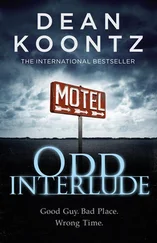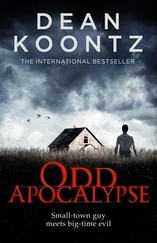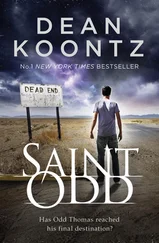After coming to a stop ten yards past the overturned vehicle, we reversed until we were beside it once more, things snapping and crunching loudly under the tires.
When I got out of the truck, I found the pavement littered with twitching constructs of bones, splintered remnants of the beast's fragmented anatomy. Some were as large as vacuum cleaners, many the size of kitchen appliances-flexing, irising, folding, unfolding as if striving to obey the conjuring call of a sorcerer.
Thousands of single bones of all shapes and sizes were also scattered on the roadway. These rattled in place as if the ground were shaking under them, but I could not feel any earth tremors through the soles of my ski boots.
Kicking the debris aside, I cleared a path to the overturned SUV and climbed onto the flank of it. Inside, tumbled brothers looked up at me, wide-eyed and blinking, through the side windows.
I pulled open a door, and Brother Rupert clambered up to assist. Soon we had pulled the Russian and the monks from the vehicle.
Some were bruised and all were shaken; but none of them had sustained a serious injury.
Every tire on the second SUV had been punctured by broken shafts of bone. The vehicle sat on flat rubber. We would have to walk the remaining hundred yards to the school.
No one needed to express the opinion that if one impossible ambulatory kaleidoscope of bones could exist, others might follow. In fact, whether because of shock or fear, few words were exchanged, and those were spoken in the softest voices.
Everyone worked urgently to unload all the tools and the other gear that had been brought to defend and fortify the school.
The rattling skeletal debris slowly grew quieter, and some bones began to break down into cubes in a variety of sizes, as though they had not been bones, after all, but structures formed from smaller interlocking pieces.
As we were setting out for the school, Rodion Romanovich took off his hat, stooped, and with one gloved hand scooped some of the cubes into that bearskin sack.
He looked up and saw me watching him. Clutching the hat in one hand as if it were a purse filled with treasure, he picked up what appeared to be a large attaché case, rather than a toolbox, and turned toward the school.
Around us, the wind seemed to be full of words, all angry and growing rapidly angrier, in a brutal language ideal for imprecation, malediction, blasphemy, and threat.
The veiled sky folded down to meet the hidden land, and the vanishment of the horizon was swiftly followed by the disappearance of every structure of man and nature. A perfect consistency of light throughout the bleak day, allowing no shadow, did not illuminate but blinded. In that white obscurity, all contours of the land faded from sight, except those directly underfoot, and we were plunged into a total whiteout.
With psychic magnetism, I am never lost. But at least a couple of the brothers might have wandered off forever, within mere yards of the school, if they had not stayed close to one another and had not received some guidance from the rapidly vanishing patches of blacktop exposed earlier by the plows.
More walking boneyards might be near, and I suspected that they would not be blinded by the whiteout, as we were. Whatever senses they possessed were not analogous-but perhaps superior-to ours.
Two steps before blundering into the segmented roll-up garage door, I saw it and halted. When the others had gathered around me, I did a count to be sure that all sixteen monks were present. They numbered seventeen. The Russian was there, but I had not mistakenly included him in the count.
I led them past the large door to a smaller, man-size entrance. With my universal key, I let us into the garage.
When everyone had passed safely inside, I closed and dead-bolted the door.
The brothers dropped their burdens on the floor, brushed snow from themselves, and pulled back their hoods.
The seventeenth monk proved to be Brother Leopold, the novice who often came and went with the stealth of a ghost. His freckled face looked less wholesome than it had always been before, and his usual sunny smile was not in evidence.
Leopold stood next to the Russian, and there was an ineffable quality to their attitudes and postures that suggested they were in some way allied.
ROMANOVICH WENT TO ONE KNEE ON THE garage floor, and from his bearskin hat, he spilled a collection of the white cubes onto the concrete.
The larger specimens were about an inch and a half square, the smaller perhaps half an inch. They were so polished and smooth that they might have been dice without spots, and looked not like natural objects but like manufactured items.
They twitched and rattled against one another, as though life yet existed in them. Perhaps they were agitated by the memory of the bone they had been, were programmed to reconstitute that structure but lacked the power.
I was reminded of jumping beans, those seeds of Mexican spurge that are animated by the movements of the moth larvae living in them.
Although I didn't believe that the agitation of these cubes was caused by the equivalent of moth larvae, I wasn't going to try to bite one open to confirm my opinion.
As the brothers gathered around to observe the blank dice, one of the larger specimens shook more violently-and rattled into four smaller, identical cubes.
Perhaps triggered by that action, a smaller cube turned end over end and rendered itself into four diminished replicas.
Glancing up from the self-dividing geometries, Romanovich locked eyes with Brother Leopold.
"Quantumizing," the novice said.
The Russian nodded in agreement.
I said, "What's going on here?"
Instead of answering me, Romanovich returned his attention to the dice and said, almost to himself, "Incredible. But where's the heat?"
As if this question alarmed him, Leopold took two steps back.
"You would want to be twenty miles from here," Romanovich told the novice. "A bit late for that."
"You knew each other before coming here," I said.
With increasing rapidity, the cubes were breaking down into ever-smaller units.
Turning my attention to the brothers, expecting them to support my demand for answers from the Russian, I discovered their attention fixed not on Romanovich or Leopold, but instead half on me and half on the strange-and ever-tinier-objects on the floor.
Brother Alfonse said, "Odd, in the SUV, when we saw that thing come out of the snow, you didn't seem stunned by the sight of it like the rest of us were."
"I was… just speechless," I said.
"There's that eye-twitch tell," said Brother Quentin, pointing at me, frowning as he must have frowned at numerous suspects in the homicide-division interrogation room.
As the cubes continued dividing, growing dramatically in number, the collective mass of them should have remained the same. Cube an apple, and the pieces will weigh as much as the whole fruit. But mass was disappearing here.
This suggested that, after all, the beast had been supernatural, manifesting in a material with more apparent substance-but no more real physical existence-than ectoplasm.
The problems with that theory were many. For one thing, Brother Timothy was dead, and no mere spirit had killed him. The SUV had not been overturned by the anger of a poltergeist.
Judging by the ghastly expression that had drained all the sunny Iowan charm from his boyish face, Brother Leopold was clearly focused on an explanation different from-and far more terrifying than-any supernatural manifestation.
On the floor, the cubes had become so numerous and tiny that they appeared to be only a spill of salt. And then… the concrete was bare again, as though the Russian had never emptied anything out of his hat.
Читать дальше
Конец ознакомительного отрывка
Купить книгу
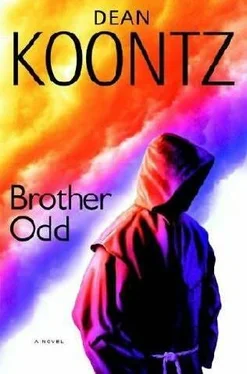
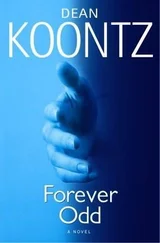
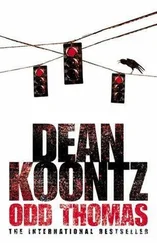




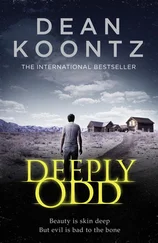
![Dean Koontz - You Are Destined To Be Together Forever [an Odd Thomas short story]](/books/705298/dean-koontz-you-are-destined-to-be-together-foreve-thumb.webp)

